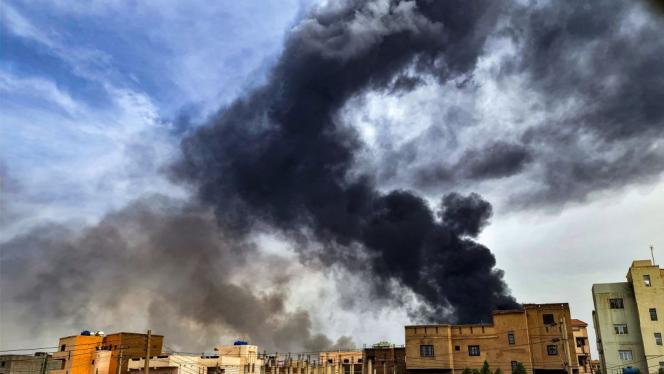Friday 15 November 2024
One year of the calamitous war in Sudan – a personal reflection

Hamid Khalafallah, a Sudanese writer and academic researcher, reflects on the war in Sudan, displacement and its broader impact on the country’s people
Where, then, were the roots that struck down into times past? Where are the memories of death and life? What had happened to the caravan and to the tribe?
– Tayeb Salih, Season of Migration to the North
On April 15, 2023, after a joyous night out with friends, I awoke to the rattle of gunfire and the thunderous explosions. A long-anticipated war had erupted between the Sudanese army (SAF) and the paramilitary Rapid Support Forces (RSF). Within hours, my hometown of Khartoum transformed into an active battlefield, its horizons ablaze with flames and smoke, its once-familiar sounds drowned out by the cacophony of bullets and explosions. The beloved city I had known was forever altered. Conflict surged in Khartoum and swiftly spread throughout the country.
The shock was daunting, and the people caught in the crossfire faced impossible decisions. Initially, my family and I decided to stay put at our home in Bahri, the northern district of Sudan’s capital, Khartoum. We tried to predict how long the conflict would last. My pessimistic take, which I now look back on with a bit of nostalgia, was three weeks. My rationale was that the international community would intervene immediately and bring the warring parties to the negotiating table within a week. Then, it would take two weeks to discuss and hammer out an agreement on de-escalation arrangements. After that, the fighting would end, and a political process would begin. I believed that the country needed a new political process prioritising the inclusion of a diverse range of actors beyond the old political elites. Security sector reform, at the heart of the conflict between the RSF and SAF, could be addressed later. Obviously, that was not the case. Consequently, at the three-week mark, we were forced to leave our home and flee for our lives.
One year on, the war is still raging with no end in sight and various efforts to resolve the conflict and broker a political resolution have stalled. The magnitude of human suffering resulting from this conflict is staggering, making it profoundly challenging to fully grasp; it has already precipitated the world's largest internal displacement crisis, with more than 8 million displaced within and outside Sudan. Moreover, access to basic services have become extremely difficult, particularly healthcare, as over 70 percent of health facilities in Sudan are inoperable or closed. Over 6.5 million children have lost access to school due to the increased violence in the country.
The conflict aggravated Sudan’s pre-existing humanitarian crisis and is pushing the country towards becoming the world's worst hunger crisis, with 18 million people – more than one third of the country’s population – already facing acute hunger. Despite these horrifying figures, only 5.8 percent of the required humanitarian funding has been received to date. The head of the UN’s humanitarian body, Martin Griffiths, has described the situation as a “humanitarian travesty,” playing out “under a veil of international inattention and inaction.”
The shamefully scant humanitarian response to Sudan’s crisis is also accompanied with a gap in global media coverage, and lack of coordinated diplomatic efforts. The lack of reporting on the situation in Sudan has made it a forgotten war causing it to largely disappear from the global consciousness and public discourse, despite the unimaginable human suffering and destruction.
Additionally, the fragmented mediation initiatives have allowed the warring factions to continue “forum shopping” and not commit to a peace process. Both causes and impacts of the war in Sudan go way beyond the country’s borders. The war in Sudan has seen various geopolitical agendas playing out, with numerous regional and international actors, including the UAE, Egypt, Turkey, Iran, Russia and Ukraine getting involved in fuelling the fighting. As such, there is an urgent need for the international community to maximise their engagement in Sudan. Without action at the highest level, the world risks becoming a “near-silent witness” to the devastating tragedies unfolding there.
The international community’s failure in engaging with Sudan and supporting the Sudanese people is not a new issue, but rather a recurring trend. Before the war, their engagement with the military factions legitimised their political ambitions. They also mostly engaged with political elites, while casting aside civilian groups on the grounds who had more legitimacy amongst the Sudanese public. After the war started, the international community didn’t address the situation with the seriousness it required and did not utilise their leverage to end the war. I wonder if there would have been a one-year anniversary of the war in Sudan if the international community had listened to local voices in Sudan and responded more urgently and in a coordinated manner. The contrast between the global response to the war in Sudan and other recent conflicts, such as Ukraine, is stark and speaks volumes about global priorities.
For the millions of Sudanese civilians impacted by the war, this has been a year defined by indescribable loss, hardship and uncertainty. Throughout this year, many have endured by holding onto the hope that this nightmare would soon end, and we could all return to our homes. For months after fleeing to Egypt, my mother refused to unpack the small piece of luggage she managed to bring with her, poised to return home the moment the war ceased. Yet, one year later, that hope seems more distant than ever, as the path to sustainable peace and reconstruction in Sudan grows increasingly uncertain. Now, many of us are compelled to confront the stark reality of permanent displacement from the home we once knew and the lives we once knew—we are left to contemplate a future where our former home becomes a subject of conversation spoken about in the past tense. A different time, but also a different place.
Now, many of us are compelled to confront the stark reality of permanent displacement from the home we once knew and the lives we once knew—we are left to contemplate a future where our former home becomes a subject of conversation spoken about in the past tense. A different time, but also a different place.
One year on and I continue to feel uprooted, struggling to establish a new life, while I continue dreaming about returning home. When we were packing to flee, I thought that we would be returning in a few weeks or so. I was very practical and restrained about what I packed in my backpack. I packed some essential documents. Instead of taking my favourite books, I packed two books that I had not read yet at the time, Why Civil Resistance Works and River Spirit. I packed a couple of practical and comfortable changes of garments, instead of my favourite pieces of clothing. The significance of my sentimental belongings dawned on me unexpectedly, but I didn’t bring them with me. Instead, I found myself holding each one tightly, trying to etch their memory into my mind
Somewhere, deep inside, I felt like I was saying goodbye. It was all incredibly overwhelming, but it was quick. There was no time for emotions, the RSF were taking over the neighbourhoods around us and our turn was imminent. I packed what I packed and left. I left behind my favourite watch, a gift from my late grandfather. I left behind photographs, gifts, souvenirs from loved ones. I left behind my paintings. I left behind my life. I left behind my roots.
Nevertheless, I want to use the anniversary of the war in Sudan as an occasion to renew our hopes that we will return, it is our last refuge. We will rebuild our homes, lives and our country. I hope the world’s gaze returns to Sudan, to ensure the international community responds to the humanitarian catastrophe before it consumes more lives than it already has. The world owes this to Sudan.






